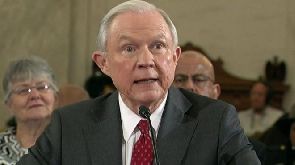Attorney General Jeff Sessions has bowed to pressure and removed himself from an FBI inquiry into alleged Russian meddling in the US election.
America’s top prosecutor said he did not lie when he testified at a January confirmation hearing that he had “no communications with the Russians”.
But Democrats are demanding he resign after it emerged he met Moscow’s envoy during last year’s White House race.
Claims of Kremlin interference have dogged President Donald Trump.
“I have decided to recuse myself from any existing or future investigations of any matters related in any way to the campaigns for president of the United States,” Mr Sessions said in a statement.
In a news conference at the Department of Justice in Washington DC, he said his comments at his confirmation hearing were “honest and correct as I understood it at the time”.
What’s Mr Sessions accused of?
During the Senate hearing on 10 January, Mr Sessions was asked: “If there is any evidence that anyone affiliated with the Trump campaign communicated with the Russian government, in the course of this campaign, what will you do?”
Mr Sessions responded: “I’m not aware of any of those activities. I have been called a surrogate at a time or two in that campaign and I did not have communications with the Russians. And I’m unable to comment on it.”
However, it has emerged Mr Sessions and Russia’s ambassador to the US, Sergei Kislyak, held a private conversation in Mr Sessions’ office in September and spoke at a meeting with several other envoys, on the sidelines of the Republican National Convention in July.
The former Alabama senator had meetings with more than 25 foreign ambassadors in the course of the year.
His meetings with Mr Kislyak came while he played a prominent part of Mr Trump’s campaign team – the so-called surrogate – and amid growing reports of Russian meddling in the US election.
Mr Kislyak is the ambassador who was at the centre of the downfall of Mr Trump’s National Security Adviser, Michael Flynn.
Mr Flynn was fired last month after he misled the White House about his conversations with the Moscow diplomat, allegedly regarding US sanctions.
What did he talk about with the envoy?
At Thursday’s news conference, Mr Sessions said he had spoken with the Russian ambassador as a US senator and not as Mr Trump’s surrogate.
He said: “I never had meetings with Russian operatives or Russian intermediaries about the Trump campaign.”
Mr Sessions said that during his conversations with the Russian ambassador, he told Mr Kislyak he had once been to Russia with a church group in 1991.
Mr Sessions said they went on to talk about terrorism and then “somehow the subject of Ukraine came up”.
The Justice Department said Mr Kislyak met Mr Sessions in his role as a member of the Senate Armed Services Committee.
It is more commonly members of the Senate Foreign Relations Committee who meet foreign ambassadors, not Armed Services Committee lawmakers,
What has President Trump said?
President Trump said in a statement to Reuters news agency on Thursday evening: “Jeff Sessions is an honest man. He did not say anything wrong.
“He could have stated his response more accurately, but it was clearly not intentional.
“The Democrats are overplaying their hand. It is a total witch hunt!”
Speaking earlier on a trip to an aircraft carrier in Virginia, Mr Trump said he “wasn’t aware” Mr Sessions had met the Russian envoy.
The US intelligence community believes alleged Russian hacking of Democratic organisations in the election run-up was done to help Mr Trump defeat Hillary Clinton.
Mr Trump has branded suggestions that he or associates on his campaign had contact with Russian intelligence as “fake news”.
What’s the view on Capitol Hill?
Democrats smell blood, and Mr Sessions’ announcement has done little to pacify them.
House Democratic leader Nancy Pelosi repeated her call for him to resign, saying “his narrow recusal and sorry attempt to explain away his perjury” were totally inadequate.
Adam Schiff, the top Democrat on the House intelligence committee, is also demanding Mr Sessions stand down, saying he “clearly misled” the Senate.
Top Republicans in the House and Senate – including Senators Rob Portman, Marco Rubio and Lindsey Graham – earlier broke ranks to say Mr Sessions should recuse himself.
Could he be charged with perjury?
Prosecutors would have to show that Mr Sessions not only made false statements, but knowingly and wilfully misled members of the committee about an indisputable fact.
Mr Sessions emphasised on Thursday that he responded to the question he was asked, asserting he believed it about campaign-related contacts and not his diplomatic conversations as a senator.
Lawmakers “are not the most precise questioners. It’s not like a deposition or grand jury, where a professional prosecutor is asking the questions”, said Stanley Brand, a Washington-attorney and former House general counsel.
Mr Sessions voted to impeach former President Bill Clinton for perjury when he was accused of lying to a grand jury about his relationship with White House intern Monica Lewinsky.








